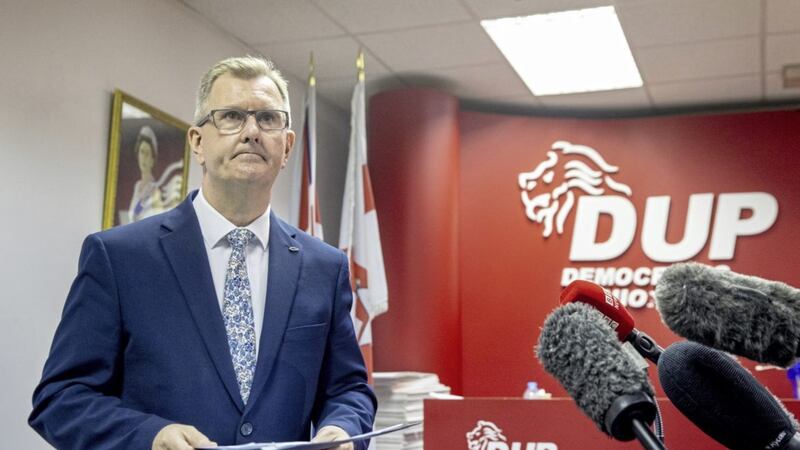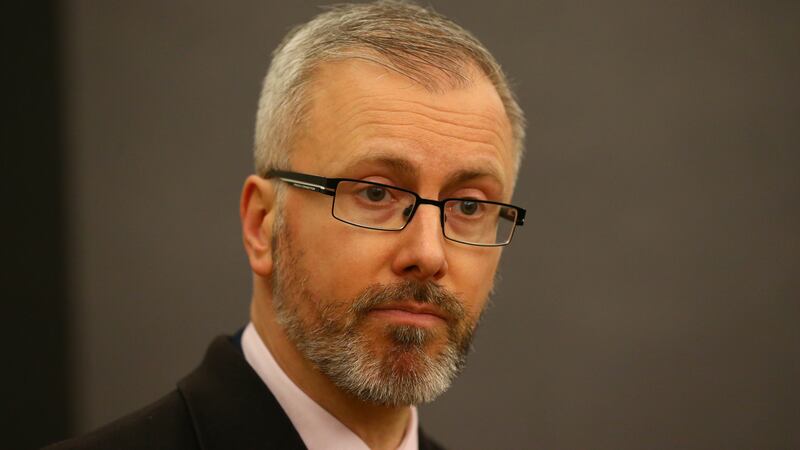It is “not realistic” to expect stability in Northern Ireland under the terms of the Brexit deal, the next leader of the Democratic Unionist Party (DUP) has warned.
Sir Jeffrey Donaldson said he would speak to Boris Johnson to underline his message.
His comments came as Brexit minister Lord Frost said it was “hard to see” how the Northern Ireland Protocol, the part of the Brexit deal at the heart of the controversy, can survive in its current form.
Sir Jeffrey was the only candidate to succeed Edwin Poots after his short-lived leadership of the DUP collapsed.
“I will be speaking with the Prime Minister at the earliest opportunity to emphasise that it is not realistic to expect stability when every unionist representative in the devolved institutions opposes the Northern Ireland Protocol,” he said.
“The Government and those who claim to be protectors of peace and stability must step up and deal with the Protocol in a manner which respects the constitutional and economic integrity of the United Kingdom.”
The comments came after outgoing DUP leader Mr Poots said he had received a personal assurance from the British Government that significant changes will be made to the Northern Ireland Protocol.
Mr Poots, who was forced to announce his resignation as leader last week following an internal party revolt over his decision to proceed with nominating a Stormont First Minister, predicted there would be a “significant victory” on the Protocol in July.
Lord Frost would not be drawn on private conversations between UK ministers and Mr Poots but accused the European Union of failing to show enough “pragmatism” to make the Protocol work.
The British Government and the EU are locked in a dispute over the implementation of the Protocol, the part of the Brexit divorce deal aimed at avoiding a hard border with Ireland.
Northern Ireland First Minister Paul Givan said he agrees with new DUP leader that there would be no political stability while the Northern Ireland Protocol remains.
Mr Givan said: “The Northern Ireland Protocol is something that has caused huge disruption and we have made very clear that it needs to go. It is not working and when the grace periods end we are looking at upwards of 15,000 checks per week and that is just not a sustainable place for Northern Ireland to be.
“Stormont has a job to do on the bread and butter issues, but absolutely the Northern Ireland Protocol creates instability because of the way it has violated the workings of the internal United Kingdom market.”
Mr Givan said he expects his new party leader to return to Stormont from his current Westminster role and to take the First Minister post.
“Jeffrey has made clear that he does want to come back to Stormont in due course and wants to be First Minister and Jeffrey will make an exceptional First Minister, nobody doubts that.”
The Republic of Ireland’s Foreign Affairs Minister Simon Coveney has congratulated new DUP leader elect Sir Jeffrey Donaldson.
He tweeted: “Congratulations (Jeffrey Donaldson) on becoming new DUP leader.
“I genuinely wish you well and look forward to working with you on the many challenges that lie ahead. Respect.”
Mr Poots indicated the promise of a “significant win” had been made by Northern Ireland Secretary Brandon Lewis.
When asked what was the nature of the changes he had been promised, Mr Poots admitted “we haven’t got detail”, but the issues that needed to be addressed were around the constitutional status of Northern Ireland.
Asked about Mr Poots’ comments, Lord Frost told the Commons Foreign Affairs Committee: “I can’t comment on private conversations and accounts of them. But we haven’t made a secret of the fact that we find it hard to see how, as currently operated, important elements of the Protocol are sustainable.
“I don’t think that’s a new judgment. We have also said that we are considering all our options, and we are doing so.
“There is a real-world timetable to things that needs to be taken into account when we do that.
“That’s where we are at the moment, we are actively considering the options to deal with a situation that is hard to see as sustainable.”
The UK has threatened to unilaterally suspend parts of the deal if it continues to cause problems – something that would trigger a retaliation by Brussels.
One of the impacts of the deal is that deliveries of chilled meats – including sausages and burgers – could be effectively banned from crossing the Irish Sea from Great Britain to Northern Ireland at the end of the month.
The UK has formally requested an extension of that grace period to avoid a so-called “sausage war” and Lord Frost said both sides were “thinking very actively about that”.
Lord Frost insisted the impact on trade between Great Britain and Northern Ireland could not have been predicted – despite warnings in advance of Brexit about the kind of difficulties that could be caused.
“The basic problem is that the chilling effect on goods moving from Great Britain to Northern Ireland is pretty strong,” he said.
“Until we began implementing the Protocol nobody could quite know that.”
He said both sides were supposed to use their best efforts to reduce checks on goods arriving in Northern Ireland, but accused the EU of showing a lack of “pragmatism and reasonableness”.
“If their approach is simply to say ‘you must just implement the EU customs code as if this were any other external frontier of the EU’ then we obviously have a problem,” he said.
Lord Frost said the politics around the Protocol would be changed “hugely” by the fact Northern Ireland has a consent vote on its continuation in December 2024.
The UK’s former Brexit negotiator said if it “isn’t acceptable to all communities in Northern Ireland”, it would be “very difficult to make it work”.








